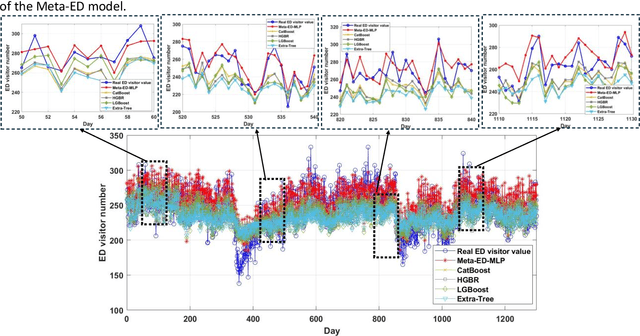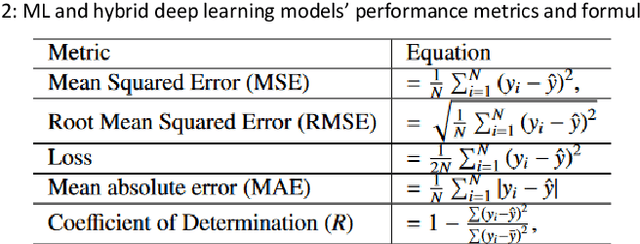Michael Phipps
Effective Predictive Modeling for Emergency Department Visits and Evaluating Exogenous Variables Impact: Using Explainable Meta-learning Gradient Boosting
Nov 18, 2024



Abstract:Over an extensive duration, administrators and clinicians have endeavoured to predict Emergency Department (ED) visits with precision, aiming to optimise resource distribution. Despite the proliferation of diverse AI-driven models tailored for precise prognostication, this task persists as a formidable challenge, besieged by constraints such as restrained generalisability, susceptibility to overfitting and underfitting, scalability issues, and complex fine-tuning hyper-parameters. In this study, we introduce a novel Meta-learning Gradient Booster (Meta-ED) approach for precisely forecasting daily ED visits and leveraging a comprehensive dataset of exogenous variables, including socio-demographic characteristics, healthcare service use, chronic diseases, diagnosis, and climate parameters spanning 23 years from Canberra Hospital in ACT, Australia. The proposed Meta-ED consists of four foundational learners-Catboost, Random Forest, Extra Tree, and lightGBoost-alongside a dependable top-level learner, Multi-Layer Perceptron (MLP), by combining the unique capabilities of varied base models (sub-learners). Our study assesses the efficacy of the Meta-ED model through an extensive comparative analysis involving 23 models. The evaluation outcomes reveal a notable superiority of Meta-ED over the other models in accuracy at 85.7% (95% CI ;85.4%, 86.0%) and across a spectrum of 10 evaluation metrics. Notably, when compared with prominent techniques, XGBoost, Random Forest (RF), AdaBoost, LightGBoost, and Extra Tree (ExT), Meta-ED showcases substantial accuracy enhancements of 58.6%, 106.3%, 22.3%, 7.0%, and 15.7%, respectively. Furthermore, incorporating weather-related features demonstrates a 3.25% improvement in the prediction accuracy of visitors' numbers. The encouraging outcomes of our study underscore Meta-ED as a foundation model for the precise prediction of daily ED visitors.
Predicting the Stay Length of Patients in Hospitals using Convolutional Gated Recurrent Deep Learning Model
Sep 26, 2024



Abstract:Predicting hospital length of stay (LoS) stands as a critical factor in shaping public health strategies. This data serves as a cornerstone for governments to discern trends, patterns, and avenues for enhancing healthcare delivery. In this study, we introduce a robust hybrid deep learning model, a combination of Multi-layer Convolutional (CNNs) deep learning, Gated Recurrent Units (GRU), and Dense neural networks, that outperforms 11 conventional and state-of-the-art Machine Learning (ML) and Deep Learning (DL) methodologies in accurately forecasting inpatient hospital stay duration. Our investigation delves into the implementation of this hybrid model, scrutinising variables like geographic indicators tied to caregiving institutions, demographic markers encompassing patient ethnicity, race, and age, as well as medical attributes such as the CCS diagnosis code, APR DRG code, illness severity metrics, and hospital stay duration. Statistical evaluations reveal the pinnacle LoS accuracy achieved by our proposed model (CNN-GRU-DNN), which averages at 89% across a 10-fold cross-validation test, surpassing LSTM, BiLSTM, GRU, and Convolutional Neural Networks (CNNs) by 19%, 18.2%, 18.6%, and 7%, respectively. Accurate LoS predictions not only empower hospitals to optimise resource allocation and curb expenses associated with prolonged stays but also pave the way for novel strategies in hospital stay management. This avenue holds promise for catalysing advancements in healthcare research and innovation, inspiring a new era of precision-driven healthcare practices.
 Add to Chrome
Add to Chrome Add to Firefox
Add to Firefox Add to Edge
Add to Edge